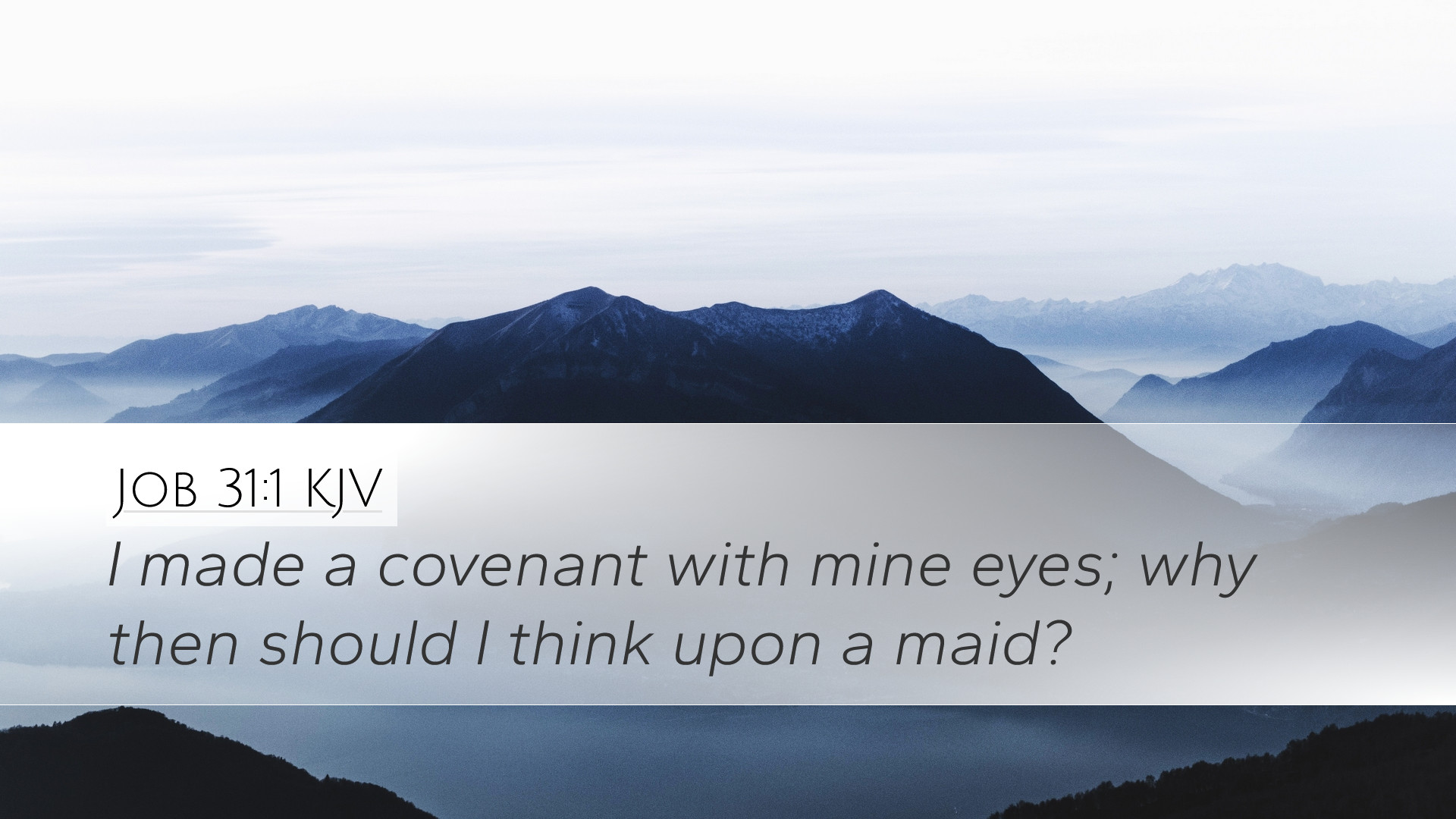Commentary on Job 31:1
Text of Job 31:1 (ESV): "I have made a covenant with my eyes; how then could I gaze at a virgin?"
Introduction
The verse from Job 31:1 stands as a powerful testament to Job's integrity, highlighting a significant theme of covenantal commitment in the Scripture. This commentary will explore various insights gathered from public domain sources such as Matthew Henry, Albert Barnes, and Adam Clarke, providing a comprehensive analysis meant for pastors, students, theologians, and Bible scholars.
Thematic Analysis
Job’s declaration about making a covenant with his eyes speaks profoundly to the moral fabric of human relationships. In this verse, Job stresses the importance of control over one’s thoughts and actions, particularly regarding lust and sexual immorality. This focus offers a relevant discussion in a contemporary context where visual stimuli abound.
Insights from Matthew Henry
Matthew Henry comments on Job’s stance by emphasizing his commitment to purity and righteousness. He notes that:
- Job understood the power of sight and its implications on the soul.
- His “covenant” denotes a serious and thoughtful approach to personal temptation, aligning with the broader biblical narrative of avoiding sin through proactive measures.
- Henry highlights the context of suffering, stressing that Job’s integrity is unwavering even amidst his trials, making his resolve even more commendable.
This insight underscores the necessity of guarding oneself against internal and external threats to holiness, drawing parallels to New Testament teachings on the matter (e.g., Matthew 5:28).
Albert Barnes’ Perspective
Albert Barnes offers a contextual analysis of the societal norms surrounding sexual purity during Job's time. He interprets the phrase “gaze at a virgin” as implying:
- A deep acknowledgement of the importance of not only avoiding sexual sin but also refraining from indulging in lustful thoughts.
- The idea of making a covenant suggests a resolution not simply to avoid action but to manage one’s thoughts and desires with intentionality.
- Barnes correlates this moral fortitude with the wisdom literature's broader theme of righteousness leading to God’s favor.
Through Barnes’ lens, readers are reminded that integrity in one's thought life is essential for a faithful life.
Adam Clarke’s Insights
Adam Clarke approaches the text with a practical application that extends beyond Job's ancient context. He emphasizes:
- The importance of making deliberate commitments concerning one's focus and desires.
- Clarke contextualizes Job's struggle with contemporary challenges, encouraging readers to establish similar ‘covenants’ or intentional practices to uphold their moral integrity.
- He also notes the cultural implications of observing a virgin, shedding light on the social dynamics of purity and virtue in Job's day.
His perspective resonates deeply, offering a call to action for contemporary readers to consider how they navigate their own moral landscapes.
Theological Implications
The theological ramifications of Job 31:1 extend into discussions of sin, covenant, and personal accountability. This passage:
- Invites reflection on the nature of sin as it pertains to thought and intention, echoing James 1:14-15 about temptation leading to sin.
- Calls for consideration of personal covenants and vows in one's faith journey, encouraging believers to proactively safeguard their spiritual integrity.
- Encourages discussions of how believers can cultivate holiness in an age of distraction and temptation.
Practical Application
As we reflect on Job’s proclamation, several practical applications arise for modern readers:
- Accountability: Establishing accountability structures within community fellowship to address issues of purity.
- Intentional Thinking: Developing strategies for managing one's thoughts, akin to Job’s covenant with his eyes; perhaps through spiritual disciplines like memorization of Scripture.
- Openness to Struggle: Acknowledging the challenges of remaining pure in thought and deed and fostering an environment of transparency regarding struggles.
This verse challenges individuals and communities to take seriously the call to be holy, urging them to pursue righteousness in all aspects of life.
Conclusion
Job 31:1 stands as a poignant reminder of the solemn responsibility each believer has regarding their inner life and moral commitments. The insights from Matthew Henry, Albert Barnes, and Adam Clarke cumulatively paint a picture of a man striving for integrity amidst profound suffering. In doing so, Job exemplifies faithfulness that transcends circumstances, a trait that calls all readers to examine their own lives in light of God's standards of holiness.


